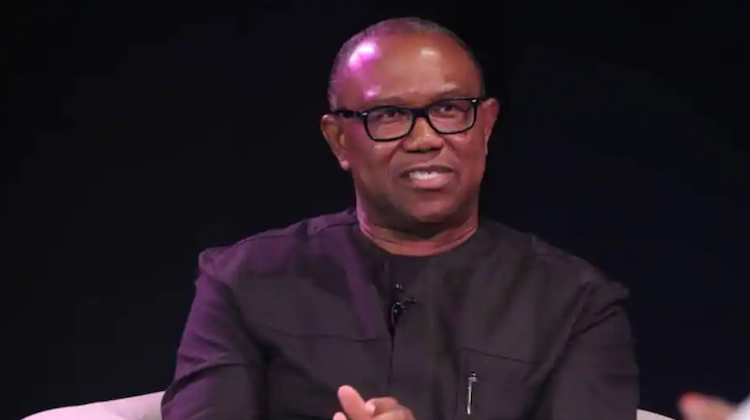Peter Obi, a prominent figure in Nigerian politics and former presidential candidate, has expressed deep concern over the escalating trend of transactional politics, a phenomenon that has gripped the nation’s political landscape. This practice involves politicians exploiting the vulnerability of young people by offering them financial incentives to spread misinformation, harass, and discredit advocates of good governance and reform on social media. Obi, speaking at Johns Hopkins University in Washington, D.C., highlighted the tragic irony of this situation: the very youth whose future is jeopardized by corruption and bad governance are being manipulated into defending the system that perpetuates their plight. He characterized this as a betrayal of the youth, emphasizing the need for them to recognize their power and agency in shaping a better future for themselves and Nigeria.
The disturbing practice, as described by Obi, involves politicians paying young people sums of ₦20,000 to ₦40,000 monthly to engage in online smear campaigns and create a climate of misinformation. Obi emphasized the disconnect inherent in this arrangement, stating that these young individuals, often struggling to make ends meet, are being used as tools to attack the very people advocating for policies and reforms that would ultimately benefit them. He argues that this transactional approach to politics not only undermines democratic processes but also robs the youth of their potential to be agents of positive change. Instead of being empowered to participate meaningfully in shaping their nation’s future, they are reduced to pawns in the political games of the elite.
Obi’s critique of transactional politics extends beyond the immediate impact of online harassment and misinformation. He sees it as a symptom of a deeper malaise within the Nigerian political system. He argues that this practice fosters a culture of dependency and discourages critical thinking, hindering the development of a vibrant and informed citizenry. By offering short-term financial gains, politicians effectively silence dissent and prevent the emergence of a more accountable and responsive government. This, according to Obi, creates a vicious cycle where corruption and bad governance thrive, further entrenching the very problems the youth face.
The former presidential candidate further underscored the urgent need for a paradigm shift in the political engagement of young Nigerians. He called for a rejection of the “crumbs” offered by corrupt politicians and an embrace of knowledge, critical thinking, and civic responsibility. Obi envisions a future where the youth are empowered not through handouts but through education and opportunities that enable them to participate constructively in the political process. He believes that only through such empowerment can Nigeria break free from the shackles of transactional politics and move towards a system driven by principles of good governance, accountability, and transparency.
Obi’s remarks come at a time when Nigeria’s digital political space is increasingly characterized by misinformation, targeted harassment, and the suppression of opposing voices. This environment, he argues, makes it even more crucial for the youth to be discerning consumers of information and to actively resist manipulation. He emphasized the importance of engaging in constructive dialogue, demanding accountability from leaders, and working towards a future where political decisions are based on merit and the best interests of the people, not on financial inducements or political expediency.
The growing prevalence of transactional politics in Nigeria, as highlighted by Peter Obi, poses a significant threat to the nation’s democratic future. The manipulation of young people for political gain not only undermines the integrity of the political process but also deprives the youth of the opportunity to contribute meaningfully to the development of their country. Obi’s call for a shift towards knowledge-based empowerment and active civic participation offers a compelling vision for a more just and equitable future for Nigeria. The challenge now lies in translating this vision into reality by fostering an environment where critical thinking, informed engagement, and genuine political discourse can flourish.














